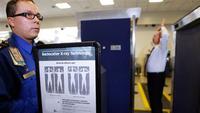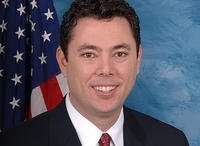-
Aware wins TSA contract for employee fingerprint scanners
Aware Inc. recently won a contract to supply the Transportation Security Administration (TSA) with biometric fingerprint scanners to help the agency conduct employee background checks
-
-
New task force helps protect Port of Virginia
A new border security task force has been launched to help secure the Port of Virginia; the task force is comprised of ten officers and agents from a total of ten local, state, and federal agencies that will be responsible for securing the Port of Virginia against a variety of criminal acts including trade fraud, cargo theft, and the illegal smuggling of drugs, persons, currency, and weapons
-
-
Buoy system helps protect U.S. ports

With America’s ports, waterways, and vessels handling more than $700 billion in goods annually, a terrorist attack on the system would have a crippling effect on the U.S. economy; to help mitigate these threats, Intellicheck Mobilisa has developed Aegeus, a series of buoys which have the capability of creating a surveillance perimeter that detects incoming vessels, biological substances, and even nuclear bombs
-
-
Underwater nuke detecting drone
Unmanned underwater vehicles (UUV) could soon be prowling the nation’s coastline to detect radiological and nuclear threats; the underwater drones, developed by New Jersey based Princeton Security Technologies, Inc., are equipped with radiological isotope identification hardware to monitor any changes below the water
-
-
San Francisco to install real-time surveillance on buses
Thanks to a $6 million DHS grant San Francisco’s MUNI buses will soon be equipped with a network of sophisticated high-tech video cameras that will allow the transit agency to view footage in real-time
-
-
TSA testing QR Codes on checkpoint signage
TSA will begin testing QR Codes at U.S. airports; the QR Codes are two-dimensional codes readable by barcode readers on smartphones; the codes may download, for free, from multiple sources on the Internet; when the code is scanned, the phone will take you directly to a Web page or other information without having to type any information into your phone
-
-
Making runways safer

Airplanes undergo significant stresses during take-off and landing, and parts often become detached, putting subsequent runway users at risk; until now, airport staff have had to monitor runways without technical assistance — an activity that is prone to errors; a new radar system is set to increase safety at airports
-
-
Report warns Amtrak vulnerable

A new report by the DHS Inspector General warns that Amtrak is vulnerable to terrorist attacks, despite the $1 billion that has already been spent to bolster security; the inspector general found that DHS officials did not ensure that the money was being spent efficiently securing Amtrak’s most vulnerable stations resulting in security gaps
-
-
U.K. airports install biometric passport readers
Individuals with biometric passports from the United Kingdom or the European Union will now be able to use sophisticated automated e-Passport scanners at every major U.K. airport
-
-
Nano sensor detects minute traces of plastic explosives
Scientists have developed an extremely sensitive explosives sensor that is capable of detecting even slight traces of the high-explosive chemical compound pentaerythritol tetranitrate (PETN); terrorists had employed PETN in several attacks on commercial aircraft
-
-
Full-body scanning for the shy

The Transportation and Security Administration will soon launch Full Body Scanning 2.0 at several New York area airports; the new software, known as Automated Target Recognition (ATR), will auto-detect items that could pose a potential threat that passengers might be carrying under their clothes, but the suspicous items will be shown against a generic outline of a person for all passengers
-
-
The TSA-Chaffetz skirmish: The latest round
In the past ten days we have witnessed an intense legal-political skirmish between DHS and two of its staunchest critics on the Hill — Representatives Jason Chaffetz (R-Utah) and Darrell Issa (R-California); at issue is information that the Transportation Security Administration (TSA) had given the subcommittee headed by Chaffetz ahead of hearings the subcommittee was to hold on airport security; Chaffetz released the information in some of these documents to the press a day before the hearings, then repeated the information in his open-to-the-public opening statement; DHS angrily charged that in revealing the information, Chaffetz had violated the law
-
-
DHS chastises Chaffetz for disclosing sensitive information

Last week, DHS officials chastised Representative Jason Chaffetz (R-Utah) for disclosing sensitive security information to the press; in a letter, Joseph Maher, DHS’s deputy counsel, scolded Chaffetz, the chair of the House Subcommittee on National Security, Homeland Defense, and Foreign Operations, for openly discussing “sensitive security information” provided by the Transportation Security Administration (TSA); the letter comes in response to Chaffetz’s comments last week that revealed that there have been more than 25,000 security breaches at U.S. airports since November 2001
-
-
DHS seizes ancient Egyptian relics in smuggling bust

Last Thursday DHS officials made an announcement that seemed more fitting for a Hollywood movie — agents had broken up an antiques smuggling ring that had illegally shipped ancient Egyptian artifacts to the United States; among the confiscated goods was a sarcophagus that dated back to the seventh century B.C.
-
-
Airport explosive detection machines not up to regulation
A recent Government Accountability Office (GAO) report reveals that airports around the United States have failed to meet federal requirements for explosives detection systems and government regulators have done little to enforce them
-
More headlines
The long view
Calls Grow for U.S. to Counter Chinese Control, Influence in Western Ports
Experts say Washington should consider buying back some ports, offer incentives to allies to decouple from China.
